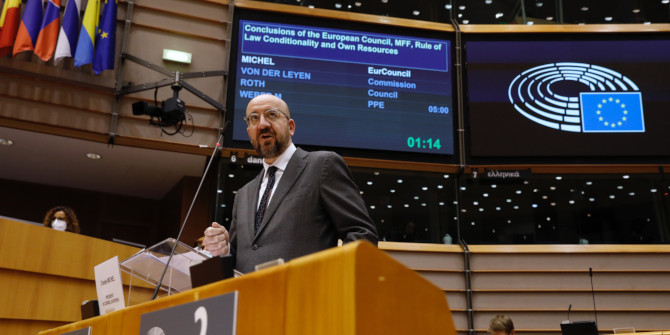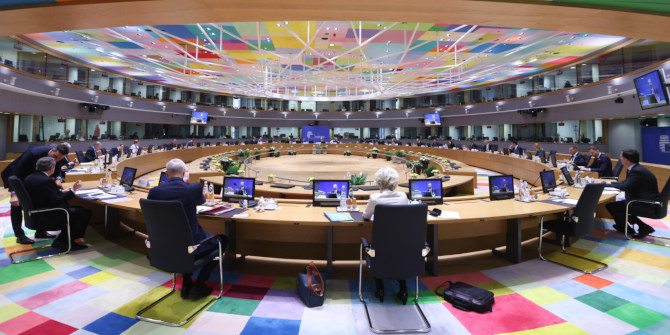When people think of EU policymaking, they generally think of developments within the EU’s institutions. But local authorities across Europe are responsible for a wide range of social and economic tasks that are regulated by the EU. Marius Guderjan and Tom Verhelst explain why understanding this local dimension of EU politics is vital for appreciating the impact of the integration process.
Looking at European integration through the prism of local government might seem a little odd at first. Since the introduction of the Lisbon Treaty, major reforms to the EU have been off the table, and the EU has faced a number of regional and global challenges during the last decade, including the euro crisis, an influx of refugees, the climate emergency, a global pandemic, Brexit, autocratic regimes breaking the Union’s fundamental principles and laws, and external security threats at the member states’ doorsteps.
In response, national governments have returned to more intergovernmental and even unilateral modes of governance to steer through difficult times. Even in less troubled waters, the relationship between the European and the local levels of government were never a hot topic among scholars of European integration. In political science, the study of local government in the EU has remained a niche subject for a rather small community of enthusiasts.
And yet, we believe that the lack of a comprehensive contemporary account of EU-local relations presented an urgent need and a great opportunity for a systematic study. This is why in a new book we link the macro-trajectories of European integration with micro-developments at the local level. Drawing from a combination of European integration theories and approaches (including intergovernmentalism, functionalism, fusion, post-functionalism, multilevel governance and Europeanisation), we introduce the idea of an ‘integration cycle’ to explain how local government responds to the evolution of European governance in different domains and phases.
Next to the ‘high politics’ dealt with in Europe’s capitals, politicians and scholars tend to forget that without cities, towns and counties EU policies could hardly be realised. Local authorities across Europe are responsible for a wide range of social and economic tasks that are regulated by the EU, including environmental change, energy transition, the integration of refugees, healthcare and other essential public services.
Through regulations and directives, but also through policy programmes and funding schemes, local authorities are drawn into the European polity. Policymakers in Brussels have therefore turned to the local level to find effective and innovative ways of developing and implementing their objectives. In particular, the European Commission and the European Parliament clearly acknowledge the essential role of local government for delivering the EU’s agenda, as a 2018 Report on the role of cities in the institutional framework of the Union indicates:
…new global challenges posed by security and immigration, demographic shift, youth unemployment, challenges relating to the quality of public services, access to clean and affordable energy, natural disasters and environmental protection demand local responses and, therefore, a stronger commitment on the part of cities when designing and implementing EU policies.
In line with our metaphor of an integration cycle, local government is not only at the receiving end of policies and laws coming top-down from Brussels. In response to European integration, municipalities adjust their practices, orientation, organisation and politics both internally and externally. Some local authorities and actors engage proactively in European affairs and connect themselves in European-wide networks and associations; the most prominent examples are the Council of European Municipalities and Regions, and Eurocities.
Local government drives ambitious initiatives that feed bottom-up into European policies around urban mobility, social service provision, environment, procurement, transport, and housing, and has strengthened the local dimension within the Cohesion Policy and the Urban Agenda. Significant constitutional and procedural reforms highlight the growing role of the local level within European integration. The Committee of Regions, the right to local self-government, and the principles of subsidiarity and partnership promoted local and multilevel governance within the EU’s formal and ‘living’ constitution.
While local actors have to make strategic choices on how to approach European decisionmakers, it is often the interplay of formal participation and informal lobbying that provides them with conditional but substantial influence in EU policymaking. According to our findings, local influence has expanded far beyond what is commonly assumed. Being systematically and officially involved in decision-making increases their chances of affecting policy in advance. In turn, informal mobilisation is more effective to wield concrete political power and to prevent unfavourable outcomes and interventions in local autonomy.
Our theoretical reflections suggest that European integration of local government represents a ‘third way’ between an intergovernmental and a supranational perspective. Functional spillover of constraining laws triggers a ‘sovereignty reflex’ to preserve local autonomy, while cultivated spillover shifts the focus of local government towards European agendas.
Political spillover then activates a small group of entrepreneurial local authorities and actors, who understand that engaging in European affairs is both a necessity and an opportunity for the future of their municipality. Considering the vast diversity of local government across Europe, the different stages of the integration cycle do not equally involve all local authorities. Yet, as local pioneers seek to shape and access EU policymaking both formally and informally, local government completes the integration cycle. Subsequently, this may trigger a new loop of top-down and bottom-up dynamics in return.
We neither suggest that European integration is an ever-continuing, irreversible process, nor that local government is its main driver. The UK and examples from other member states have shown that Eurosceptic politics set clear limits to the integration of all levels. Nevertheless, in times when both long-established and fairly young, democracies are challenged by populist and radical movements, cities, towns and counties can be a vital locus of political discourse and legitimacy.
Taking municipal insights and preferences better into account can make European governance more effective and in line with local practices. It can also help strengthen the links between citizens and EU institutions. This way, the European integration of local government enhances both the EU’s input and output legitimacy. After all, local governments are democratically elected stakeholders within the EU with clear expertise concerning their policy challenges on the ground.
Being in direct touch with their citizens, local authorities take a vital role in overcoming national borders and contributing to a mutual understanding of differences and commonalities. It is in this spirit that our research seeks to improve our understanding of local government in the EU for politicians and people working in public authorities at multiple levels, as well as for academics who may find our empirical and theoretical insights useful for their own endeavours.
For more information, see the authors’ new book, Local Government in the European Union: Completing the Integration Cycle (Palgrave Macmillan, 2021)
Note: This article gives the views of the authors, not the position of EUROPP – European Politics and Policy or the London School of Economics. Featured image credit: Gabriella Clare Marino on Unsplash





